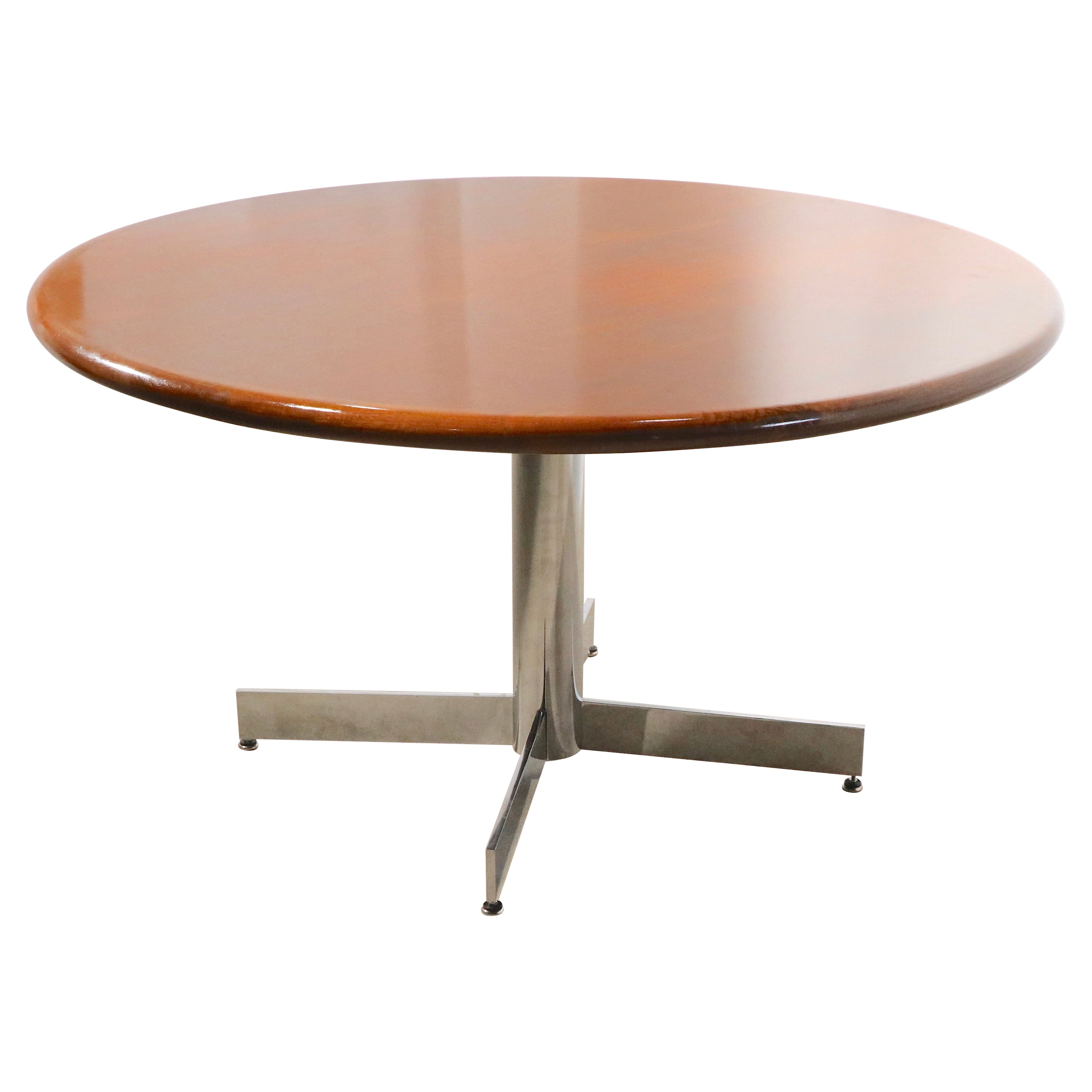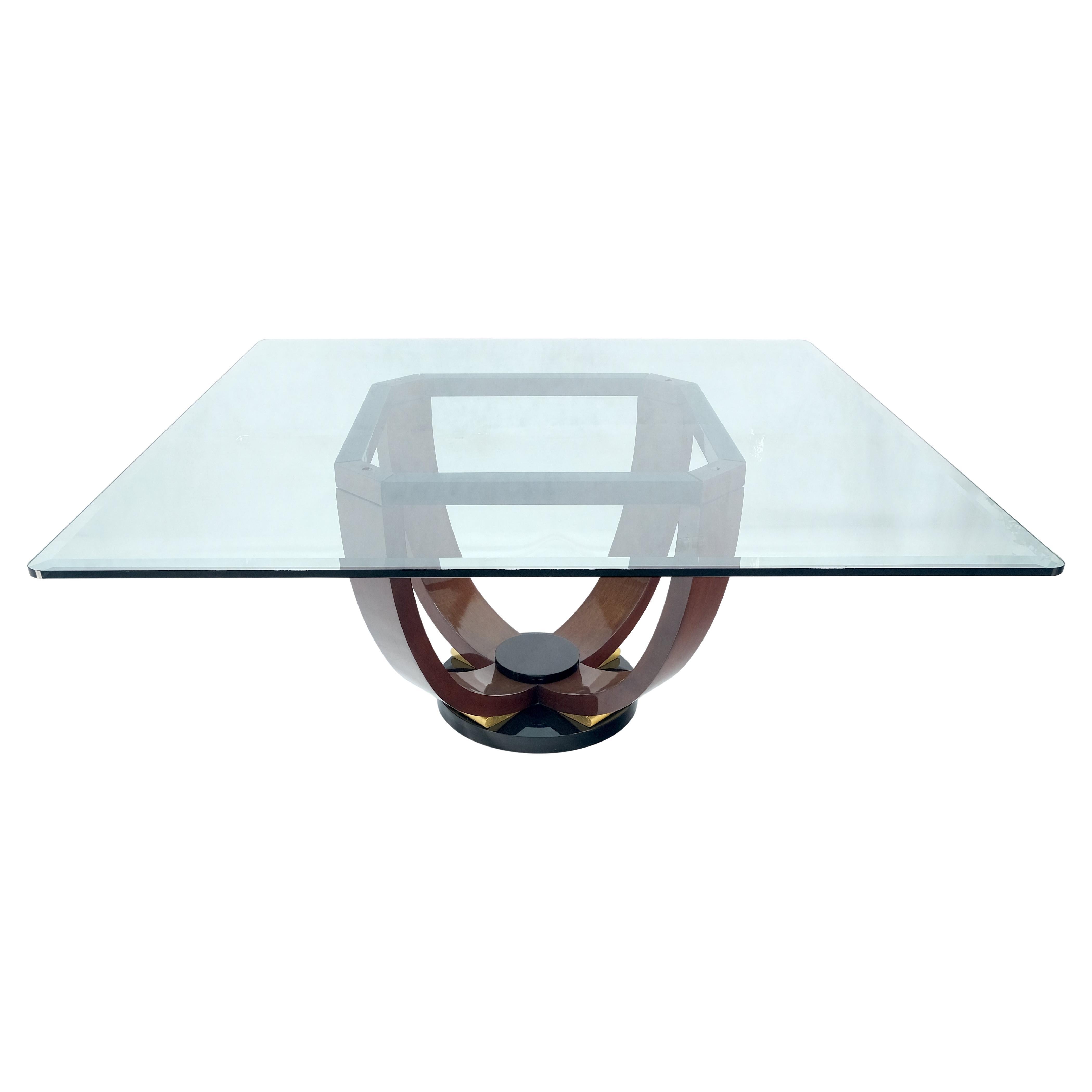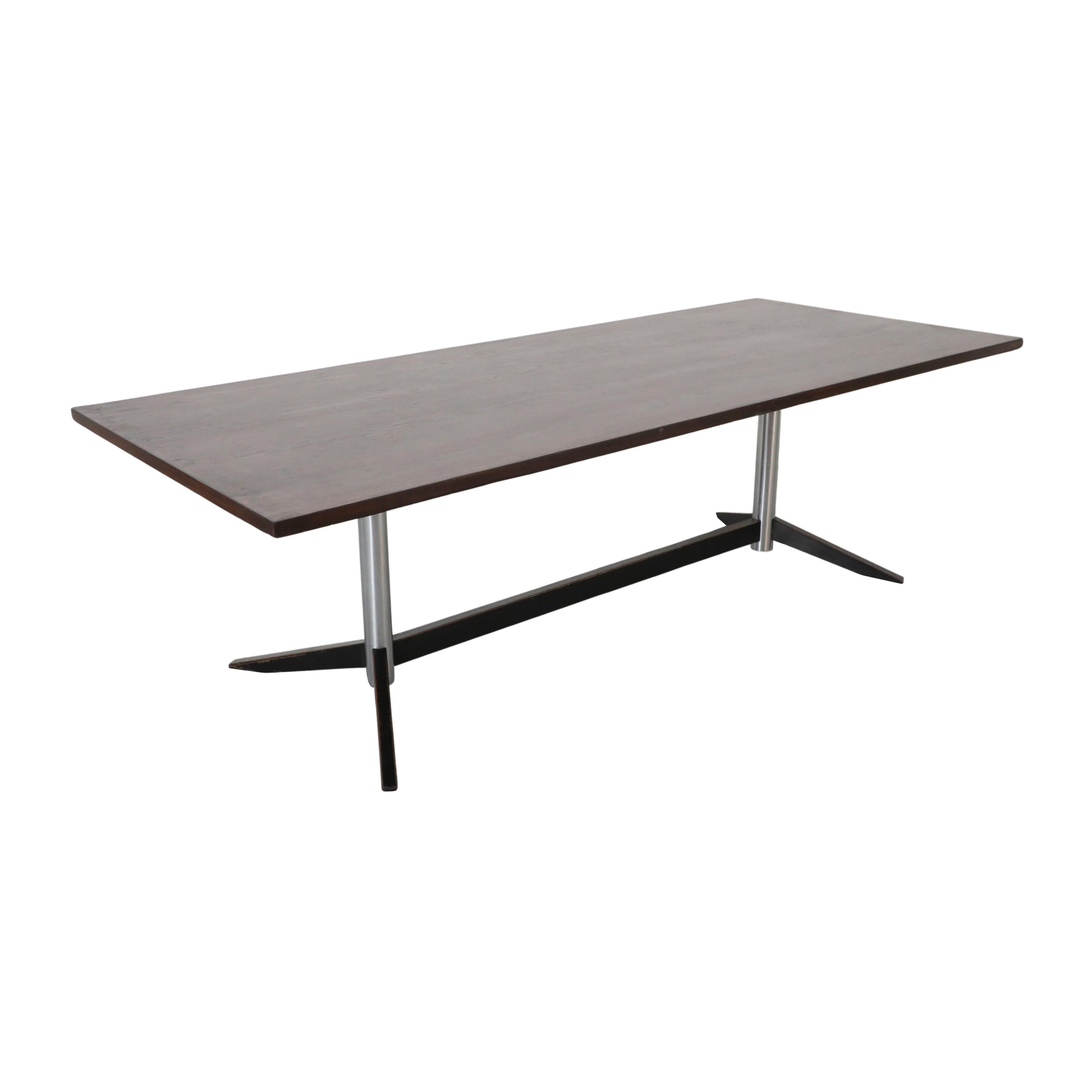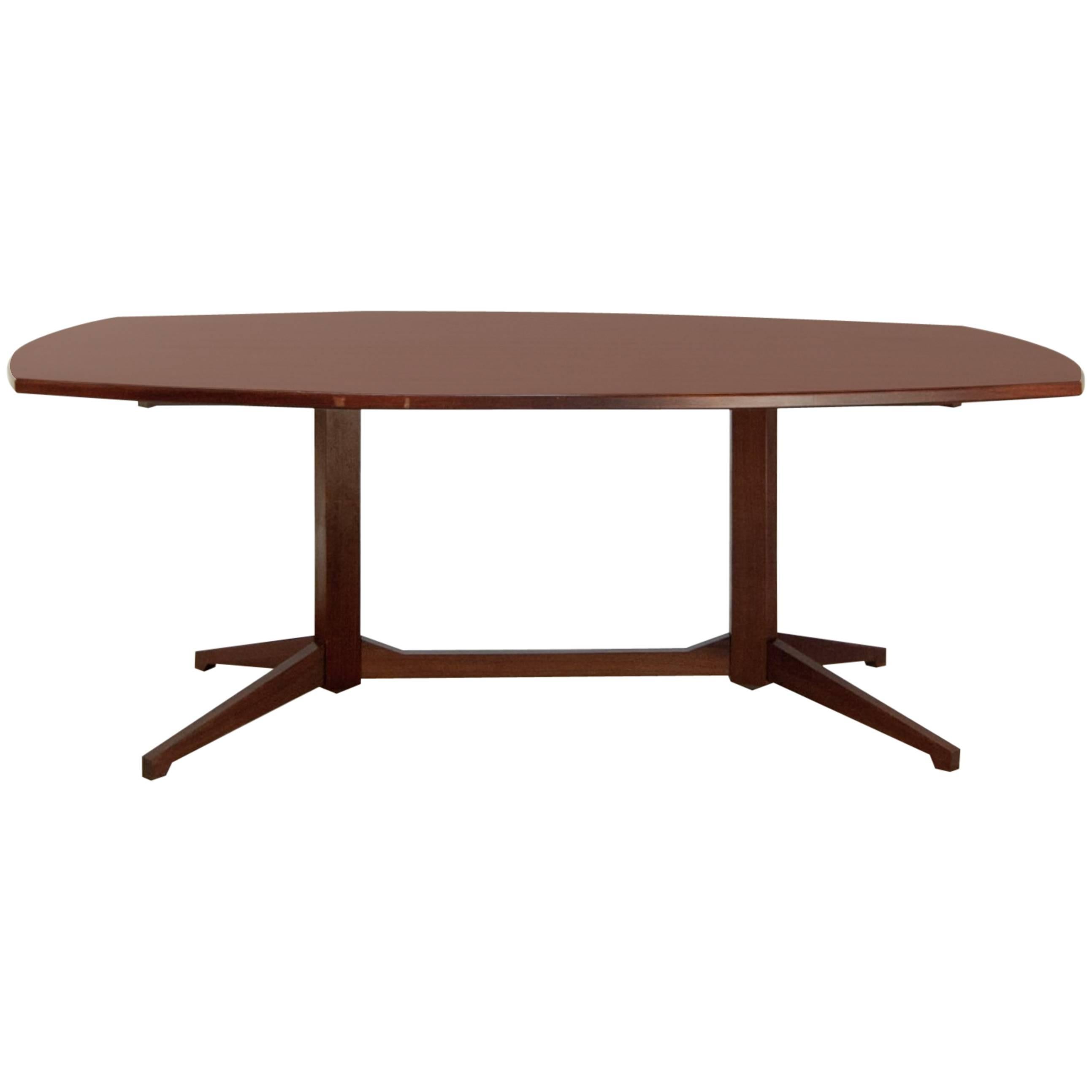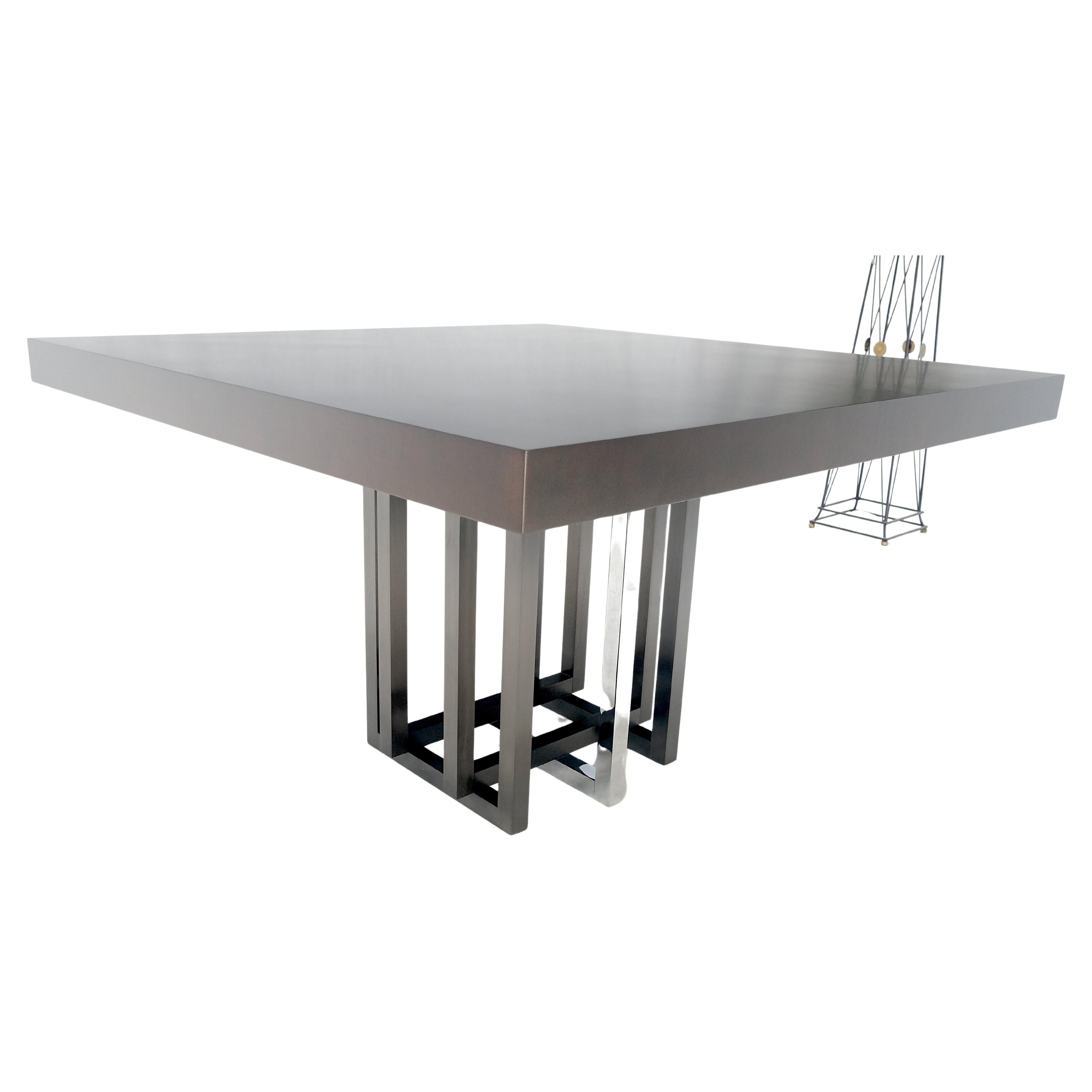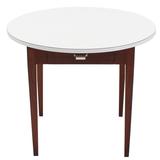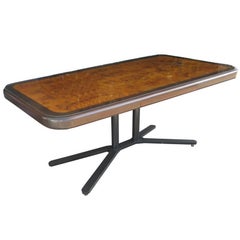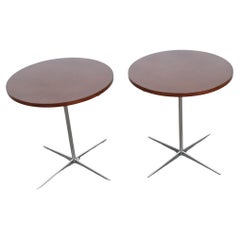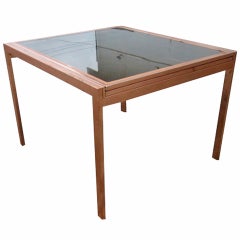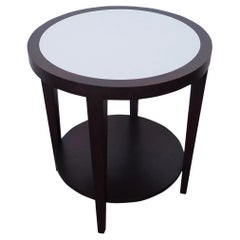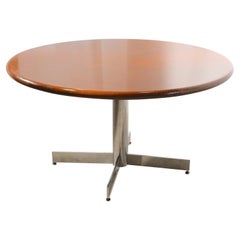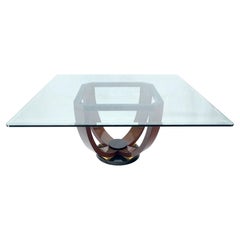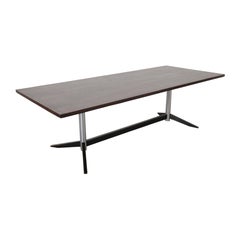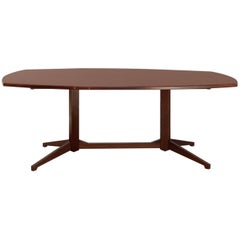Items Similar to 42" ICF Helikon Pedestal Base Table w/ Flame Mahogany Top
Want more images or videos?
Request additional images or videos from the seller
1 of 9
42" ICF Helikon Pedestal Base Table w/ Flame Mahogany Top
$2,900
£2,153.10
€2,508.95
CA$4,026.14
A$4,503.49
CHF 2,343.64
MX$55,439.46
NOK 29,815.97
SEK 27,973.26
DKK 18,719.26
Shipping
Retrieving quote...The 1stDibs Promise:
Authenticity Guarantee,
Money-Back Guarantee,
24-Hour Cancellation
About the Item
ICF Helikon Flame Mahogany Game Table
Helikon was a family-owned manufacturer since its founding in 1959 with a history of making fine office furniture. ICF Group, acquired Helikon in 1996.
Beautifully grained game or dining table
42" x 42" x 30"H
Please see matching credenza available.
- Creator:Helikon (Manufacturer)
- Dimensions:Height: 30 in (76.2 cm)Width: 42 in (106.68 cm)Depth: 42 in (106.68 cm)
- Style:Mid-Century Modern (In the Style Of)
- Materials and Techniques:
- Place of Origin:
- Period:
- Date of Manufacture:1970s
- Condition:Wear consistent with age and use.
- Seller Location:Pasadena, TX
- Reference Number:1stDibs: LU867135412352
About the Seller
4.6
Gold Seller
Premium sellers maintaining a 4.3+ rating and 24-hour response times
Established in 1999
1stDibs seller since 2009
1,521 sales on 1stDibs
Typical response time: 2 hours
- ShippingRetrieving quote...Shipping from: Pasadena, TX
- Return Policy
Authenticity Guarantee
In the unlikely event there’s an issue with an item’s authenticity, contact us within 1 year for a full refund. DetailsMoney-Back Guarantee
If your item is not as described, is damaged in transit, or does not arrive, contact us within 7 days for a full refund. Details24-Hour Cancellation
You have a 24-hour grace period in which to reconsider your purchase, with no questions asked.Vetted Professional Sellers
Our world-class sellers must adhere to strict standards for service and quality, maintaining the integrity of our listings.Price-Match Guarantee
If you find that a seller listed the same item for a lower price elsewhere, we’ll match it.Trusted Global Delivery
Our best-in-class carrier network provides specialized shipping options worldwide, including custom delivery.More From This Seller
View AllVintage Helikon Burled Top Desk Table on a Bronze Base
Located in Pasadena, TX
Mid century table or desk with a burled wood top and a bronze base. Pencil drawer.
This piece can work as a table or a desk.
Category
Vintage 1960s American Mid-Century Modern Desks and Writing Tables
Materials
Bronze
Pair of Marc Thorpe for Bernhardt Designs Side Tables w/ Curly Maple Tops
Located in Pasadena, TX
This is a nice pair of Marc Thorpe side tables. These tables have a pedestal chrome base and curly maple tops.
Dimensions:
Height: 19"
Width: 19"
Depth: 19"
Category
20th Century Danish Mid-Century Modern Side Tables
Materials
Maple
Vintage Milo Baughman Style Extension Dining Table
By Milo Baughman
Located in Pasadena, TX
Vintage Milo Baughman Style Extension Dining Table
Circa 1970s
Rectangular copper & smoked glass dining table in the style of Milo Baughman
Glass top with copper lining
Made in U...
Category
Vintage 1970s American Mid-Century Modern Dining Room Tables
Materials
Copper
2 Tier Side Table by Barbara Barry for HBF Studio
By Barbara Barry, HBF
Located in Pasadena, TX
Trestle Round 2 Tier Side Table by Barbara Barry for HBF Studio
Rich walnut 2 tier side table with composite top and tapered legs.
Category
21st Century and Contemporary North American Modern Side Tables
Materials
Ebony
$1,520 Sale Price
20% Off
Mahogany Round Table
Located in Pasadena, TX
Mahogany Round Table
29" x 29"
Category
Late 20th Century Mid-Century Modern Side Tables
Materials
Wood
$1,770
Birdseye Maple Knoll Reff Conference Table
By Knoll
Located in Pasadena, TX
84" Birdseye maple Knoll reff conference table
Beautiful maple top with Knoll Reff polished chrome base. Media cable access.
Category
Vintage 1970s North American Mid-Century Modern Dining Room Tables
Materials
Birdseye Maple
You May Also Like
Mid Century Dining Conference Table with Round Solid Walnut Top on Chrome Base
By Ward Bennett, Knoll
Located in New York, NY
Exceptional dining, or conference table, having a thick solid walnut top, which is supported by a bright chrome pedestal base with four chrome legs which radiate from the center pole...
Category
Vintage 1970s American Mid-Century Modern Dining Room Tables
Materials
Chrome
Large 66" Square 3/4" Glass Top Italian Pedestal Base Dining Conference Table
By Pace Collection, Brueton
Located in Rockaway, NJ
Large 66" Square 3/4" Glass Top Italian Lacquered Pedestal Base Dining Conference Table MINT!
Category
20th Century Italian Mid-Century Modern Dining Room Tables
Materials
Glass, Hardwood
Martin Visser Wenge Top, Double Pedestal Base "TC06" Dining or Conference Table
By Martin Visser, 't Spectrum
Located in Los Angeles, CA
Martin Visser "TC06/TC07" double pedestal dining table with steel and black enameled metal base. Designed in 1970 by Dutch post-war designer Martin Visser for acclaimed manufacturer ...
Category
Vintage 1970s Dutch Mid-Century Modern Dining Room Tables
Materials
Metal
Franco Albini Mahogany mid-centry Italian Table Model TL-22 produced by Poggi
By Franco Albini
Located in Barcelona, ES
Franco Albini & Franca Helg.
Dining table model no. TL22.
Manufactured by Poggi,
Italy, 1958.
Mahogany.
Measurements:
180.3 cm x 104.1 cm x 73 H cm.
70.98 in x 40.98 in x 28.74 in.
Literature:
Giuliana Gramigna, Repertorio 1950/1980, Milan, 1985, p. 123.
Franco Albini, was born in 1905 and died in 1977. He spent his childhood and part of his youth in Robbiate in Brianza, where he was born. Albini, as an adolescent moved with his family to Milan. Here he enrolled in the Faculty of Architecture of the Polytechnic and graduated in 1929. He started his professional activity in the studio of Gio Ponti and Emilio Lancia, with whom he collaborated for three years. At the 1929 International Exhibition in Barcelona (where Gio Ponti curated the Italian pavilion and Mies van der Rohe realized that of Germany) and in Paris where, as Franca Helg recounted, he had the opportunity to visit the studio by Le Corbusier.
In those three years, the works he carried out are admittedly of the twentieth century imprint. It is the meeting with Edoardo Persico that marked a clear turning point towards rationalism and the approach to the group of editors of "Casabella". The partly ironic and partly very harsh comments of the Neapolitan critic to a series of drawings, made by Albini for the design of some office furniture, caused him a great disturbance. “I spent days of real anguish - Albini recalls - I had to answer all the questions. I also had a fever, a large and long fever. "
The meted provoked Albini to openen a professional studio in via Panizza with Renato Camus and Giancarlo Palanti. The group of architects began to deal with public housing by participating in the competition for the Baracca district in San Siro in 1932 and then building the IFACP neighborhoods: Fabio Filzi (1936/38), Gabriele D'Annunzio and Ettore Ponti (1939).
During this period, Albini also worked on his first villa (Pestarini), which Giuseppe Pagano, architect and critic of the time, presented as follows: “This coherence, which the superficial rhetoric of fashionable jugglers calls intransigence, and which is instead the basis of understood between the fantasy of art and the reality of the craft, in Franco Albini, it is so rooted that it transforms theory into a moral attitude ".
But it is above all in the context of the exhibitions that the Milanese master experienced his compromise between that "rigor and poetic fantasy" of which Pagano speaks, coining the elements that became a recurring theme in his . The opening in 1933 of the new Triennale headquarters in Milan, in the Palazzo dell'Arte, was an important opportunity to express the strong innovative character of rationalist thinking, a gym in which to freely experiment with new materials and new solutions, but above all a "method". "Cultivated as a communication laboratory, the art of setting up was for the rationalists of the first generation what the perspective had been for the architects of humanism: the field open to a hypothesis of space that needed profound reflections before landing the concreteness of the construction site ".
Together with Giancarlo Palanti, Albini on the occasion of the V Triennale di Milano set up the steel structure house (with R. Camus, G. Mazzoleni, G. Minoletti and with the coordination of G. Pagano), for which he also designed the 'furniture. At the following Triennale of 1936, Persico dided, together with a group of young designers gathered by Pagano in the previous edition of 1933, Franco Albini took care of the preparations of the home exhibition. The setting up of Stanza per un uomo, at that same Triennale, allows us to understand the acute and ironic approach of Albini, as a man and as a designer: "Celebrating the beauty of mechanics was the imperative to which, for example, the surprising displays by Franco Albini who managed, in the subtle way of a refined and rarefied style, to sublimate their practical content in the metaphysics of daring still lifes: flying objects which marked in the void refined frames and metal intricacies the nodes of a fantastic cartography where industry finally became art free from purpose ".
That same year Albini and Romano designed the exhibition of the Ancient Italian Goldsmithery: vertical uprights, simple linear rods, designed the space. A theme, of the "flagpole", seemed to be the center of the evolution of production and the creative process. The concept is reworked over time, with the technique of decomposition and recomposition typical of Albinian design: in the preparation of the Scipione Exhibition and contemporary drawings (1941) the tapered flagpoles, on which the paintings and display cases were hung, are supported by a grid of steel cables; in the Vanzetti stand (1942) they take the V-shape; in the Olivetti shop in Paris (1956) the polished mahogany uprights support the shelves for the display of typewriters and calculators.
The flagpole is found, however, also in other areas. In the apartments he designed, it is used as a pivot on which the paintings can be suspended and rotated to allow different points of view, but at the same time as an element capable of dividing the spaces. The Veliero bookcase...
Category
Mid-20th Century Italian Mid-Century Modern Dining Room Tables
Materials
Mahogany
Bronzed & Chrome Base Ebonized Mahogany Square Top Conference Dining Table MINT!
By Harvey Probber
Located in Rockaway, NJ
Bronzed & Chrome Base Ebonized Mahogany Square Top Conference Dining Table MINT!
Category
20th Century American Mid-Century Modern Tables
Materials
Chrome, Bronze
Nice Oiled Walnut Base Round Laminated Top Side Table
By Jens Risom, Drexel
Located in Rockaway, NJ
Mid-Century Modern, one-drawer walnut base side occasional table.
Category
